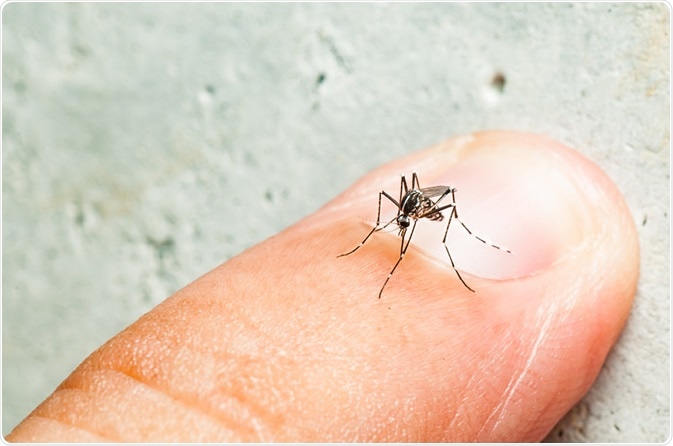Aedes mosquitoes are significant vectors of various human diseases, as they can transmit a myriad of pathogens responsible for substantial human morbidity, suffering, and mortality. The genus was initially described by a German entomologist Johann Wilhelm Meigen, and the name was derived from the Greek word that means “distasteful” or “unpleasant.”

Aedes mosquito. Image Credit: Fendizz / Shutterstock
These mosquitoes have successfully undergone a process of domestication (i.e., breeding in the human-occupied territories), which resulted in the Aedes genus's ability (but also other genera of mosquitoes) to breed near humans and feed off of human blood. Their aggressive biting behavior makes them a serious threat during outdoor activities and an abundant vehicle for transmitting serious diseases.
Biology and distribution of
Aedes mosquitoes are considered to have high invasive potential, as their eggs are capable of withstanding long transportation and desiccation for many months. Eggs are usually black and ovoid in shape, laid singly on damp substrates, and able to enter diapause (i.e., a period of suspended growth).
While certain Aedes species are known to breed in in-ground pools and marshes, an added number of them (namely subtropical species) are found in natural container-habitats such as tree-holes, leaf axils, bamboo stumps, and rock-pools, or man-made ones such as tin cans, water-storage pots, and tires.
The range of Aedes mosquitoes globally extends well into northern and arctic areas, where they can be extreme biters and serious pests to humans and livestock. Due to human commerce and travel, they have successfully spread from their native tropical forests of Asia to practically every continent – except Antarctica.
Species-characteristic disease transmission
Aedes aegypti is a species known to transmit viruses that cause tropical fevers such as yellow, Dengue, and Chikungunya. It is also suggested as a possible vector of the Venezuelan Equine Encephalitis (VEE) virus. Past vector competency studies have demonstrated Aedes aegypti to transmit the West Nile virus.
Zika virus, an emerging pathogen linked to microcephaly in infants, has also been isolated from Aedes aegypti mosquitoes collected in the field. Additional studies in the laboratory showed the propensity of this mosquito species for Zika virus transmission. Thus it is considered a vector for this disease.
Aedes albopictus has a role in transmitting dengue virus, chikungunya virus, and filarial nematodes from the genus Dirofilaria. It is also considered a competent vector for at least 22 other arboviruses – among them are yellow fever virus, West Nile virus, Japanese encephalitis virus, Rift Valley fever virus, equine encephalitis viruses, and even Zika virus.
Aedes japonicus, the third invasive mosquito species reported in Europe, has been identified as a competent vector of West Nile virus by experimental studies and La Crosse virus and Japanese encephalitis virus. This mosquito can also transmit chikungunya and dengue, but less successfully compared to the two aforementioned species.
Aedes koreicus was proven to be an effective transmitter of Japanese encephalitis virus, and Dirofilaria immitis and has an intermediate capacity for transmitting a nematode Brugia malayi to humans. Another Aedes species, Aedes triseriatus, is a known vector of La Crosse virus. Aedes togoi is a minor vector of periodic bancroftian and brugian filariasis.
In conclusion, from more than 700 Aedes species currently described, only a fraction of them are proven vectors of arboviruses and other pathogens. Nevertheless, the interrelation between the type, number, and competence of these mosquitoes and disease transmission needs further clarification to implement proper vector control measures and reduce the associated disease burden.
Further Reading
Last Updated: Dec 21, 2022